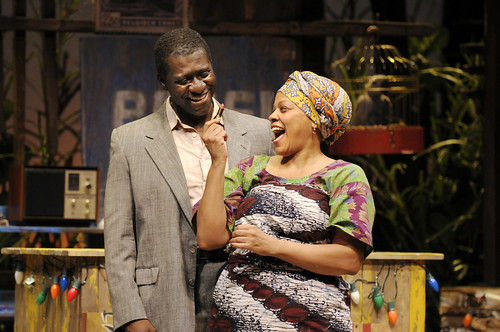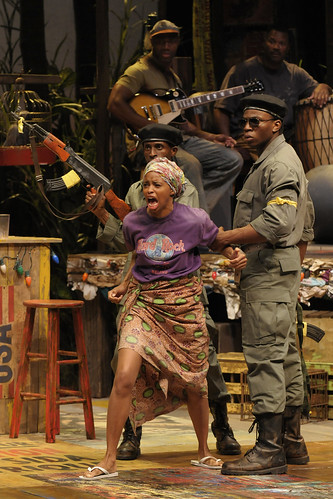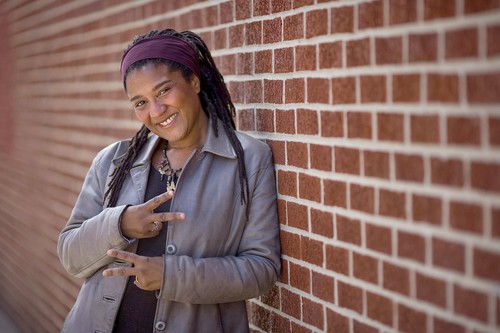EXTENDED THOUGH OCT. 28

Bowman Wright (left) is Lincoln and Biko Eisen-Martin is Booth, brothers juggling for the title of Topdog/Underdog, Suzan-Lori Parks’ Pulitzer Prize-winning play at Marin Theatre Company. Below: Wright in costume for Lincoln’s day job as a presidential target in a shooting gallery. Photos by David Allen
“Know what is and what ain’t,” one brother advises another in Suzan-Lori Parks’ mesmerizing play Topdog/Underdog. Telling what is from what ain’t is a tricky business in this deceptively straightforward play about an older brother named Lincoln and a younger brother named Booth. You don’t expect men with those names – chosen by their father, who liked a joke – not to come to blows, and given we see a pistol within the first few minutes of the play, it’s not really surprising when Parks goes from contemporary to Greek drama in a single gunshot.
Parks’ Topdog won the Pulitzer Prize for Drama in 2002, and shortly after the play’s run on Broadway, it stopped in at San Francisco’s Curran Theatre, where Parks’ extraordinary language, rich with urban slang frothed into gritty poetry and laced with deeply felt emotion, made a huge impression and justified all the fuss being made over the play.
Nearly a decade later, the play is back, this time at Marin Theatre Company, and though that language and its rhythms are still very much present in the play, what comes through most strongly in director Timothy Douglas’ production is the pull of family ties and the inescapable power of the past to shape the present.
If some of the rhythms of the 2 1/2-hour play seemed off at Tuesday’s opening-night performance, actors Bowman Wright as Lincoln and Biko Eisen-Martin as Booth still etched vivid characters that only grew more complex as the evening wore to its inevitable close. The older brother/younger brother dynamic creates real tension here, especially in an early dinner scene when we learn that Lincoln, separated from his wife, is bunking with Booth in his squalid apartment only temporarily. But of the two, only Lincoln has a steady job. He dresses up as Honest Abe, stovepipe hat, beard, white face and all, and lets people reenact the Lincoln assassination at a shooting gallery. Booth, on the other hand, is striving to master his brother’s old grift: three-card monte. On this night, Lincoln has brought home Chinese food for dinner, but who sets the table, who paid for the food and who’s a guest in whose home becomes one of many power plays both large and small.
Another interesting dynamic between the two men involves their parents, who both abandoned the boys at different times. First the dad left, then, when the boys were 11 and 16, the mom took off. When the dad bolted, he left Lincoln with $500. When it was mom’s turn, she rolled five $100 bills and tucked them in a nylon stocking for Booth. Each boy, then, has become allied in a way to a particular parent, and that comes into their brotherly dynamic in interesting ways.
Wright as Lincoln gives a performance that sneaks up on you. He’s so laid back and disconnected as to be not fully present on stage. But as Booth slowly pulls his brother back into the card game (cards and games seem to take on heavy metaphorical weight here), Wright really comes to life.
Eisen-Martin’s Booth, on the other hand, is all nervous energy and desperation. He loves his brother but wants to top his brother. He’s got abandonment issues and a needy ego. To impress his girlfriend, Grace, he “boosts” slick suits for both him and Lincoln, and when it comes time to make dinner for Grace, he steals champagne (and crystal glasses) and a beautiful dinner service. But when he is spurned by the object of his affection, his flashes of charm quickly turn to flaring danger.
Director Douglas’ production heightens the otherworldly aspect of Parks’ play even while he grounds it in familiar familial tensions. Mikiko Useugi’s set puts a realistically run-down apartment (the brothers joke they live in the third world) in a sort of patriotic purgatory, with American flags and stars-and-stripes bunting surrounding reality in faded colors and unsettling angles.
It’s an appropriately off-kilter world for this story, with is both recognizable and foreign, a family drama that stretches from here back to Cain and Abel, and a modern work of art that fractures contemporary culture through the prism of a provocative and powerful playwright.
FOR MORE INFORMATION
Suzan-Lori Parks’ Topdog/Underdog continues an extended run through Oct. 28 at Marin Theatre Company, 397 Miller Ave., Mill Valley. Tickets are $36-$57. Call 415-388-5208 or visit www.marintheatre.org.





